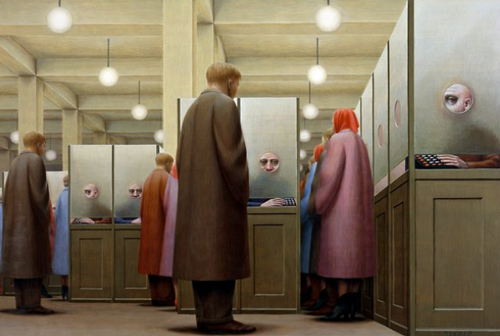Okay. Does anyone need to have it explained to them again what the Republican strategy is?
When Bush took office ten years ago amid “controversy” over whether his tax plan would create a deficit (with the liberals foolishly believing that the Republicans were sincere about wanting a balanced budget), I argued that it was actually clearly the intent of the Republicans to create as big a deficit as possible because it serves their policy wishes.
- firstly, it gloriously appears to justify cutting expenditures on programs that benefit the average American
- secondly, it seems to prove that governments can’t be trusted to spend wisely (even though it’s usually the Republican government that can’t balance the budget)
- thirdly, it creates the kind of noise Republicans need to try to generate mass hysteria about some kind of “crisis” that requires draconian measures to deal with.
They did it with Reagan (who raised the deficit from 45 billion to 450 billion) and they did it with Bush (who took a surplus and turned it into a deficit in only one year) and they will do it again next year with Palin or Gingrich or whomever.
Don’t believe me? How many Republicans made it a campaign issue when Bush ran up the deficit within less than a year of taking office after Clinton left a surplus?
But the whole strategy is rarely as naked as it is in Wisconsin where Governor Walker took a budget that was virtually balanced, handed out huge tax cuts to corporations, proclaimed a crisis when the cuts put the budget in deficit, and then, after refusing the offers of the public sector unions to rescind some of their own wages and benefits, attacked their right to collective bargaining.
It’s absolutely naked: there is a war, in the U.S., of the rich upon the poor. And you watch and you wonder, in amazement, that the poor, believing some insane illusion about justice and prosperity, refuse to fight back. Why the hell should the public sector employees have rescinded their own wages and benefits so that Wisconsin corporations could get a larger tax break?
Why is no one asking stockholders and profitable corporations to make some sacrifices because times are tough and the nation has to pull together and we are at war and so on?
Corporate share of federal taxes in the 1950’s: 30%
Corporate share of federal taxes in 2009: 6.6%
What the hell’s going on here: 30% of General Electric’s massive income comes from…. lending.
GE is a bank.
And here we are again– how rich America goes after the wealth of working America. They found out there was no way around paying people to work, so they evolved ways of reabsorbing that wealth through interest rates, hidden fees, tricked out mortgages, and shifting the tax burden.
The war on Iraq mattered because of the oil. It’s an achievement to not only persuade Americans to fight an entire war to sustain your investments, but also to pay a disproportionate cost of it by borrowing the money, running the federal budget into a deficit, and cutting taxes on the rich.
Now think about that– what sector of the economy gives you the warm fuzzies about productivity and employment and enduring prosperity: manufacturing.
What GE used to be known for.
What sector of the economy makes you think about scumbags, liars, and cheats: that’s right– banking.
GE is a bank.
I’ll bet you think I’m kidding when I tell you that the American tax system is so twisted that it actually transfers wealth from the working classes to the rich– here’s more detail on that. General Electric, one of the most profitable corporations in American history, pays no taxes at all. In fact, the U.S. government appears to “owe” GE about $4 billion.
This is the result of various strategies. When Republicans talk about reducing the tax burden for Americans, they deliberately identify the beneficiary as “Americans” when, in fact, I doubt they have proposed a single policy in the past 30 years that benefits average working Americans. It’s code, and the corporations and the rich know understand it. As when they propose to cut the budget, partly, by laying off tax collectors. The message is, we’ll make it less likely that you’ll get caught cheating on your taxes.
GE smartly hired people from the IRS to work for them, and to lobby the government on their behalf.
America– I’m sorry if you feel bad because I think you have the dumbest voters on the planet, but think about the fact that the people you elected are asking you to make serious sacrifices for the good of the nation, because times are tough, while simultaneously reducing the tax burden on those most able to pay is mind-blowing.
You are suckers.
Is GE embarrassed at all by this? Why, in America, should they be?


